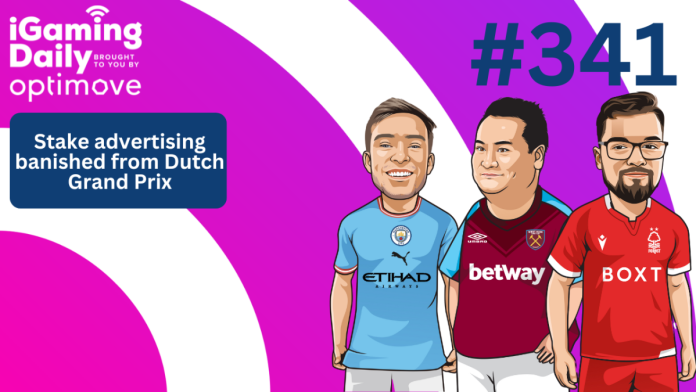In the week before the Dutch Formula 1 Grand Prix, the Netherlands gambling authority De Kansspelautoriteit (KSA) demanded that Stake.com branding be removed from the team it sponsors as the gambling provider was not licensed in the country.
On the latest episode of iGaming Daily, supported by Optimove, Ted Menmuir, SBC’s Content Director, was joined by Ted Orme-Claye and Callum Williams from the Insider Sport Team to take a look at the reasons behind this development and what it could mean for wider gambling sponsorship opportunities.
The KSA placed its ruling because Stake does not have a license in the country and is therefore not allowed to offer its services in the Netherlands.
Under Dutch gambling legislation, any betting or gaming company is prohibited from offering games of chance without a licence and from advertising or promoting those same games.
The KSA’s ruling has the potential to impact the marketing strategies of operators seeking multi-country sponsorship deals. Last month, UEFA announced that it had appointed Bet365 and Betano as the official betting partners of the Champions League, Europa League and Conference League competitions respectively.
Williams said: “It is a market-to-market issue that gambling operators would and should be aware of. For instance, the football leagues in Spain and Italy have a hard widespread ban on gambling sponsorships on shirts and advertisements.
“But operators have still found activation ways around this rule. You can see off the field with fan participation methods on digital social channels. They’ve been able to get their brand on some of these platforms.
“I think it’s about gambling companies just knowing where they need to be, and where they need to be registered in. And then it’s about forging relevant sponsorships that can take them to the next level in terms of branding and marketing value.”
Orme-Claye added that it is not just sports betting operators that need to be wary of rules across different.
Part of Formula 1’s recovery strategy following the COVID-19 pandemic was to target strategic commercial partnerships. Orme-Claye explained that the organisation will need to apply the same due diligence as operators when pursuing partnerships with the sports betting industry to ensure that they don’t clash with certain regulations within the countries where it holds race events.
In response to the rise in sports betting sponsorships in recent years, some sporting organisations have developed their codes of conduct regarding sports betting sponsors to ensure the agreements fall within regulatory guidelines.
Additionally, Orme-Claye explained that organisations and operators have been putting a focus on responsible gambling as part of their marketing strategies.
He said: “I think the way it’s going to roll forward is that responsible gaming is going to have to be put at the forefront of various advertising campaigns.
“We’ve already seen that a lot with adverts. You see just as many adverts now where a company talks about the tools they’ve got to help you stay in control almost as much if not more than talking about what betting markets they have going on over the weekend.
“We’re seeing that in the US as well. Various companies focus very heavily on putting money into responsible gaming initiatives and have been very public about that. I think that’s going to be what defines the future of how these commercial relationships go about.”





